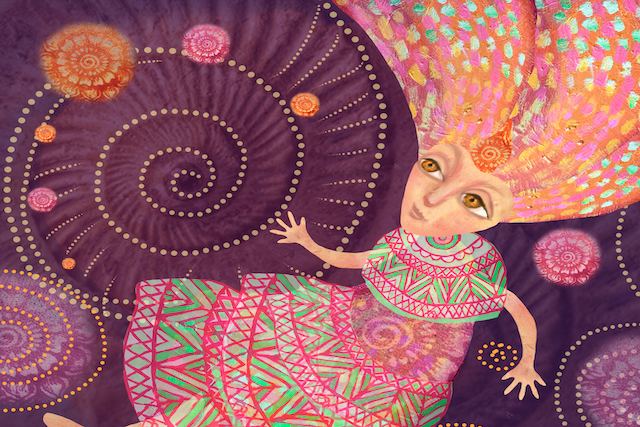
“Don’t let the fear of the time it will take to accomplish something stand in the way of your doing it.” ~Earl Nightingale
Anyone who has experienced chaotic childhoods will find stability as an adult difficult.
When you grow up in an environment where shouting is the norm, unstable relationships are all you observe, and moods are determined by others in your household, it’s hard to ever feel relaxed.
An adult who has been dealing with long-term consequences of childhood chaos and instability, I am prone to making the most outlandish sounds now.
And I know I’m not alone when I say instability is all I have experienced.
One time, my flatmate joked with me. “What’s wrong with you? I live with you!”She came out of her room and I was shocked again.
I am not familiar with stability, peace and stillness.
If chaos is all there is, then stability can be very unsettling.
Sabotage Stability
Stability can feel so unsettling to me that I’ll unconsciously sabotage its presence in my life, for example, by overthinking and causing myself anxiety over things being ‘calm.’
If everything seems to be going well, I’ll subconsciously look to create some sort of problem in my life.
Perhaps a friend texts me a message that seems less friendly than usual, but we’ve been close and getting on for months. It’s possible that I will raise an issue or cause a problem with them.
My mind is an expert at creating problems that really aren’t there.
My relationships are the most affected by my battle for stability. Of course, I’ve done the necessary work (in therapy and beyond) and know that this is largely due to complex trauma and my disorganized attachment style, but it doesn’t make things easier.
Sometimes, it can be even harder to know all this because everything appears so complicated and hard.
Why stability is a unpleasant experience
According to my therapist, adult life often mirrors the familial dynamics that we had as children. This has certainly been true for me.
In order to feel loved and accepted in relationships, I’ve had to struggle to find love. I’ve also recreated the abusive cycle many times by accepting and tolerating emotional and sometimes physical abuse.
Only a year ago did I realize this. It was, as you can imagine, quite an epiphany moment.
For me, it’s taken a lot of courage to move away from drama-fueled relationships and to look instead for stability.
Since we’re hardwired to expect instability and chaos when we have a turbulent background, stability can often feel boring. This is what I find most often.
Many adults have trouble functioning without the chaos, screaming, or familiar abuse. Simply put, their identity or relationships are threatened when there is stability, as they aren’t sure how to behave or feel when the instability is taken away.
How I’m Learning to Grow Comfortable with Stability
It’s a process for sure for many of us, but not an impossible one. Or at least that’s what I remind myself.
Sometimes I find it totally baffling that I’m more comfortable with instability rather than stability. However, my brains can still be trained so we are always able to find new ways of being human.
Once we gain greater self-awareness and realize we do not have to engage in abusive or chaotic relationships, we are ready to accept stability.
Understanding why abusive or emotionally unsuitable partners is difficult requires a lot more inner work. There is indeed such a thing as love addiction, which involves seeking out abusive relationships in order to ‘save’ or be a ‘savior.’
One book I’ve found to be extremely insightful and useful for exploring the concept of love addiction is Women Who Love Too Much,Robin Norwood. The book was written for women like me who often find themselves stuck in unhealthy patterns of relationships.
The author goes on to explore why this happens and what they do in order to recreate the same childhood memories. She also explains how women can feel low about their self-worth. It’s something I feel can relate too.
The Key to Healing: Self-love Is the Best Medicine
We can heal and recover when we love and accept ourselves. You must be able to see the beauty in yourself before you can accept or attract stability.
For me, I’m still not fully healed and try to sabotage stability in many ways. However, I am far healthier and content than I’ve ever been—and all of this has come from revisiting and confronting my childhood to gain an understanding of who I am and what has shaped my life, along with my relational tendencies.
When you continually pour love into yourself and work to understand how your past has shaped you, you’re in a better position to create a brighter future.
I’m finally beginning to accept the love I give to myself and the love from others. While I still get urges to sabotage or feel bored without drama, I can see and understand when I’m entering such a state.
For me, this means I’m able to better prevent the sabotaging behavior, give myself love, and accept the stability that I deserve.
![]()
Evie Graham
Evie Graham has a passion for her personal self-growth and uses her words to motivate. Practicing both visual arts and written art, she’s dedicated to connecting with others and helping people realize their own potential. Creativity flows through just about everything she does—including the quirky and unique!
Participate in the discussion! You can click here to comment.
Tiny Buddha’s post Why Stability is Unsettling After Growing Up in Chaos originally appeared on Tiny Buddha.
